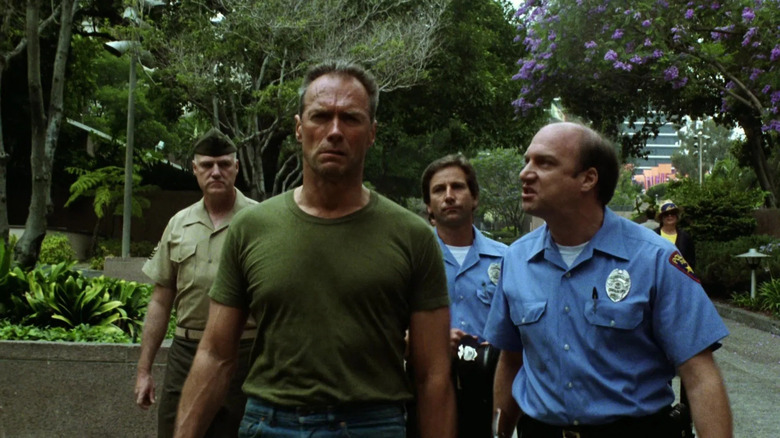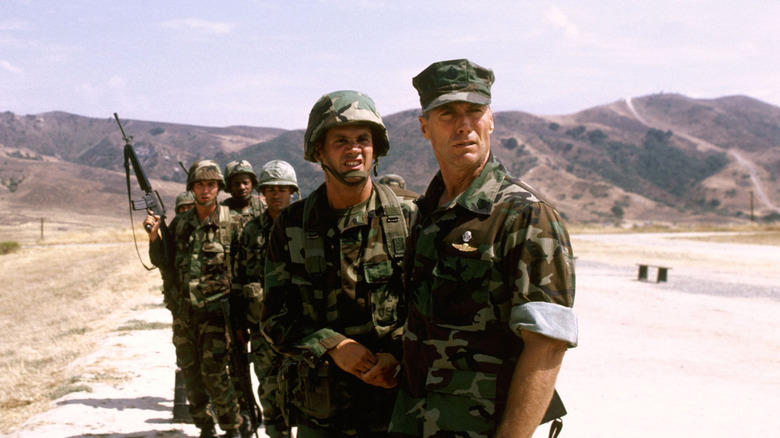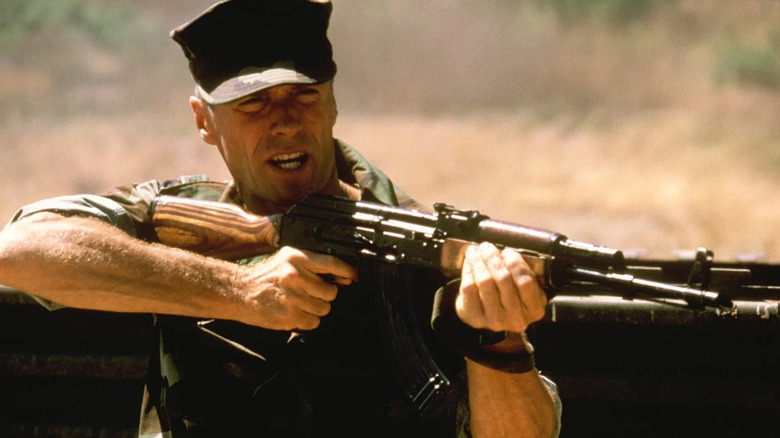One Clint Eastwood War Movie Was Loved By Soldiers But Hated By The Government
If you're seeing an American film about the American military, the chances are good that it won't be an antiwar polemic. American productions that feature soldiers and military equipment and/or explore the inner workings of the U.S. armed services typically have to cooperate with the Pentagon in order to get a movie made. The Army, the Navy, the Marines, etc., often provide a film production with uniforms, vehicles, weapons, or even training for its actors, under the stipulation that the military be allowed to give its approval of the script. War films can, of course, be made without the approval of the U.S. military, but if they're critical of the U.S. armed forces in any way, the government will openly sneer at them.
It's easy to find hit films that vaunt the military. "Captain Marvel," for instance, came hand-in-hand with Air Force recruitment videos, and even some films that claim to be about pacifism — see: "Hacksaw Ridge" — end up glorifying violence anyway. Meanwhile, some films — like Terrence Malick's "A Hidden Life" or Edward Berger's "All Quiet on the Western Front" — are pointedly against the very notion of war and don't make the soldiers' experiences look too rosy.
When soldiers themselves go to see these movies, though, they are likely unconcerned with the political viewpoints of the filmmakers or the collaboration a studio might have made with the Pentagon. They're probably going to enjoy films that look at soldiers as people and seek out movies that accurately capture both the negative and positive aspects of their gigs as government-sponsored weapons handlers.
Case in point: Clint Eastwood's 1986 film "Heartbreak Ridge," a riff on "Twelve O'Clock High," wherein a seasoned Marine is called back into action to whip an unruly platoon into shape. The military brass hated "Heartbreak Ridge." According to an article in the Los Angeles Times, soldiers loved it.
Soldiers loved Eastwood's Heartbreak Ridge
In "Heartbreak Ridge," Eastwood plays Tom Highway (as in "my way or the Highway"), a Marine who is seen as having aged out of the modern military. Despite this, he is called back into the service and given the sure-to-fail gig of training an utterly hopeless reconnaissance platoon, soon to be shipped off to Granada. The platoon fell into ill behavior because their previous commander was indifferent to their success. The soldiers (Mario Van Peebles among them) are indeed whipped into shape, and Highway leads a campaign to rescue captured Americans held captive by Cubans.
This sounds like typical rah-rah pro-military patriotism, a common type of movie made during the Reagan administration. Weirdly, the military hated it. According to the L.A. Times article, a Marine-sponsored "Heartbreak Ridge" benefit screening at a local YMCA was canceled after an unspecified person of authority actually saw Eastwood's movie. Also, the actual Marines who appeared in the background of the film had their credits removed. What beef did the Marine Corps have with "Heartbreak Ridge"? It seems it merely didn't like Eastwood's character, Tom Highway. This was a character who behaved in a reckless fashion, doing things like firing weapons near his trainees to get them used to the sound. He also barked orders and cussed openly, which the Marine Corps didn't like to see in a mainstream feature film. Note that "Heartbreak Ridge" came out the year before Stanley Kubrick's imminently more cruel "Full Metal Jacket."
The Los Angeles Times article also pointed out that the ordinary, active-duty Marines that saw it loved it. They pointed out that cussing among soldiers (obviously) was even more common in real life than in the movie and that "old-fashioned" stereotypes like Tom Highway were 100% realistic.
The Corps hated Heartbreak Ridge, while active-duty Marines thought it was realistic
The Marines were even asked if they would have chosen a different actor to portray a tough-as-nails Marine Corps drill instructor, but they all said that Eastwood, one of cinema's bastions of masculinity, was perfect. The higher-ups in the Corps that objected to "Heartbreak Ridge" were clearly trying to wrangle the military's public image. They objected because "Heartbreak Ridge" actually faced in the direction of realism.
There were some unrealistic elements that the active-duty Marines observed, though. It seems that the undisciplined platoon was cartoonishly out-of-character for a Marines platoon, even one that was poorly trained. They also said that even callow Marines leaders weren't as sniveling as the ones depicted in Eastwood's film.
Eastwood called out the Marine Corps in the L.A. Times article, noting that canceling a YMCA benefit was uncouth merely because they objected to certain elements of his film. After all, it was pro-military at the end of the day and depicted soldiers operating at their best. As Eastwood put it:
"It's a shame that a charity has to lose money because of somebody who's got a bee under his rear end somewhere. [...] With all these earth-shattering things going on back there [the Iran arms crisis], you wouldn't think they would spend energy on something like this. It is not something of national security. In the words of Alfred Hitchcock, 'It's just a movie.'"
It's interesting to note how much had changed since World War II. In the 1949 John Wayne film "Sands of Iwo Jima," Wayne is seen slamming a rifle butt into the face of an inferior officer. That sort of thing would have him drummed out of the military in real life, but the consultants on that film found it to be fine. At the end of the day, it's all just about image and publicity.


